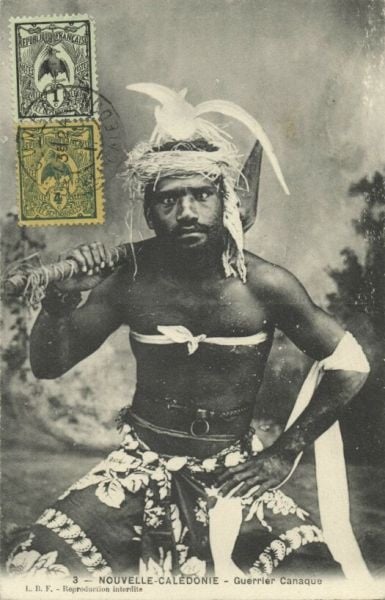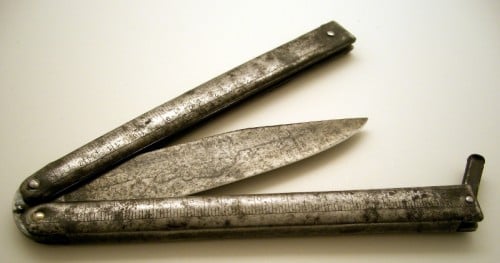The Fourth Man (5)
By:
May 14, 2015

From the nineteen-teens until his death in 1956, American author and explorer John Russell wrote dozens of adventure yarns for such magazines as The Golden Book, Argosy, and The Saturday Evening Post. I first came across “The Fourth Man” (Collier’s, Jan 6. 1917) in The Pocket Book of Adventure Stories (1945, ed. Philip Van Doren Stern), when I was an adolescent in the early ’80s. It’s one of the greatest tales of suspense ever. Enjoy!
A calm had fallen, as it does between trades in this flawed belt, an absolute calm. The air hung weighted. The sea showed no faintest crinkle, only the maddening, unresting heave and fall in polished undulations on which the lances of the sun broke and drove in under their eyelids as white-hot splinters; a savage sun that kindled upon them with the power of a burning glass, that sucked the moisture from poor human bits of jelly and sent them crawling to the shelter of their mats and brought them out again, gasping, to shrivel anew. The water, the world of water, seemed sleek and thick as oil. They came to loathe it and the rotting smell of it, and when the doctor made them dip themselves overside they found little comfort. It was warm, sluggish, slimed. But a curious thing resulted….
While they clung along the edge of the raft they all faced inboard, and there sat the black Canaque. He did not join them. He did not glance at them. He sat hunkered on his heels in the way of the native, with arms hugging his knees. He stayed in his place at the stern, motionless under that shattering sun, gazing out into vacancy. Whenever they raised their eyes they saw him. He was the only thing to see.
“Here is one who appears to enjoy himself quite well,” remarked Dubosc.
“I was thinking so myself,” said Fenayrou.
“The animal!” rumbled Perroquet.
They observed him, and for the first time with direct interest, with thought of him as a fellow being — with the beginning of envy.
“He does not seem to suffer.”
“What is going on in his brain? What does he dream of there? One would say he despises us.”

“The beast!”
“Perhaps he is waiting for us to die,” suggested Fenayrou with a harsh chuckle. “Perhaps he is waiting for the reward. He would not starve on the way home, at least. And he could deliver us — piecemeal.”
They studied him.
“How does he do it, doctor? Has he no feeling?”
“I have been wondering,” said Dubosc. “It may be that his fibers are tougher — his nerves.”
“Yet we have had water and he none.”
“But look at his skin, fresh and moist.”
“And his belly, fat as a football!”
The Parrot hauled himself aboard.
“Don’t tell me this black beast knows thirst!” he cried with a strange excitement. “Is there any way he could steal our supplies?”
“Certainly not.”
“Then, name of a dog, what if he has supplies of his own hidden about?”
The same monstrous notion struck them all, and the others swarmed to help. They knocked the black aside. They searched the platform where he had sat, burrowing among the rushes, seeking some secret cache, another bottle or a gourd. They found nothing.
“We were mistaken,” said Dubosc.
But Perroquet had a different expression for disappointment. He turned on the Canaque and caught him by the kinky mop of the hair and proceeded to give him what is known as gruel in the cobalt mines. This was a little specialty of The Parrot’s. He paused only when he himself was breathless and exhausted and threw the limp, unresisting body from him.
“There, lump of dirt! That will teach you. Maybe you’re not so chipper now, my boy — hein? Not quite so satisfied with your luck. Pig! That will make you feel.” …

It was a ludicrous, a wanton, a witless thing. But the others said nothing. The learned Dubosc made no protest. Fenayrou had none of his usual jests at the garroter’s stupidity. They looked on as at the satisfaction of a common grudge. The white trampled the black with or without cause, and that was natural. And the black crept away into his place with his hurts and his wrongs and made no sign and struck no blow. And that was natural too.
The sun declined into a blazing furnace whereof the gates stood wide, and they prayed to hasten it and cursed because it hung enchanted. But when it was gone their blistered bodies still held the heat like things incandescent. The night closed down over them like a purple bowl, glazed and impermeable. They would have divided the watches again, though none of them thought of sleep, but Fenayrou made a discovery.
“Idiots!” he rasped. “Why should we look and look? A whole navy of ships cannot help us now. If we are becalmed, why so are they!”
The Parrot was singularly put out.
“Is this true?” he asked Dubosc.
“Yes, we must hope for a breeze first.”
“Then, name of God, why didn’t you tell us so? Why did you keep on playing out the farce?”

He pondered it for a time. “See here,” he said. “You are wise, eh? You are very wise. You know things we do not and you keep them to yourself.” He leaned forward to peer into the doctor’s face. “Very good. But if you think you’re going to use that cursed smartness to get the best of us in any way — see here, my zig, I pull your gullet out like the string of an orange…. Like that. What?”
Fenayrou gave a nervous giggle and Dubosc shrugged, but it was perhaps about this time that he began to regret his intervention in the knife play.
For there was no breeze and there was no ship.
By the third morning each had sunk within himself, away from the rest. The doctor was lost in a profound depression, Perroquet in dark suspicion, and Fenayrou in bodily suffering, which he supported ill. Only two effective ties still bound their confederacy. One was the flask which Dubosc had slung at his side by a strip of the wickerwork. Every move he made with it, every drop he poured, was followed by burning eyes. And he knew and he had no advantage of them in knowing that the will to live was working its relentless formula aboard that raft. Under his careful saving there still remained nearly half of their original store.
The other bond, as it had come to be by strange mutation, was the presence of the black Canaque.
RADIUM AGE SCIENCE FICTION: “Radium Age” is HILOBROW’s name for the 1904–33 era, which saw the discovery of radioactivity, the revelation that matter itself is constantly in movement — a fitting metaphor for the first decades of the 20th century, during which old scientific, religious, political, and social certainties were shattered. This era also saw the publication of genre-shattering writing by Edgar Rice Burroughs, Sax Rohmer, E.E. “Doc” Smith, Jack London, Arthur Conan Doyle, Aldous Huxley, Olaf Stapledon, Karel Čapek, H.P. Lovecraft, Charlotte Perkins Gilman, Yevgeny Zamyatin, Philip Gordon Wylie, and other pioneers of post-Verne/Wells, pre-Golden Age “science fiction.” More info here.
READ GORGEOUS PAPERBACKS: HiLoBooks has reissued the following 10 obscure but amazing Radium Age science fiction novels in beautiful print editions: Jack London’s The Scarlet Plague, Rudyard Kipling’s With the Night Mail (and “As Easy as A.B.C.”), Arthur Conan Doyle’s The Poison Belt, H. Rider Haggard’s When the World Shook, Edward Shanks’ The People of the Ruins, William Hope Hodgson’s The Night Land, J.D. Beresford’s Goslings, E.V. Odle’s The Clockwork Man, Cicely Hamilton’s Theodore Savage, and Muriel Jaeger’s The Man with Six Senses. For more information, visit the HiLoBooks homepage.
SERIALIZED BY HILOBOOKS: Jack London’s The Scarlet Plague | Rudyard Kipling’s With the Night Mail (and “As Easy as A.B.C.”) | Arthur Conan Doyle’s The Poison Belt | H. Rider Haggard’s When the World Shook | Edward Shanks’ The People of the Ruins | William Hope Hodgson’s The Night Land | J.D. Beresford’s Goslings | E.V. Odle’s The Clockwork Man | Cicely Hamilton’s Theodore Savage | Muriel Jaeger’s The Man With Six Senses | Jack London’s “The Red One” | Philip Francis Nowlan’s Armageddon 2419 A.D. | Homer Eon Flint’s The Devolutionist | W.E.B. DuBois’s “The Comet” | Edgar Rice Burroughs’s The Moon Men | Charlotte Perkins Gilman’s Herland | Sax Rohmer’s “The Zayat Kiss” | Eimar O’Duffy’s King Goshawk and the Birds | Frances Hodgson Burnett’s The Lost Prince | Morley Roberts’s The Fugitives | Helen MacInnes’s The Unconquerable | Geoffrey Household’s Watcher in the Shadows | William Haggard’s The High Wire | Hammond Innes’s Air Bridge | James Branch Cabell’s Jurgen | John Buchan’s “No Man’s Land” | John Russell’s “The Fourth Man” | E.M. Forster’s “The Machine Stops” | John Buchan’s Huntingtower | Arthur Conan Doyle’s When the World Screamed | Victor Bridges’ A Rogue By Compulsion | Jack London’s The Iron Heel | H. De Vere Stacpoole’s The Man Who Lost Himself | P.G. Wodehouse’s Leave It to Psmith | Richard Connell’s “The Most Dangerous Game” | Houdini and Lovecraft’s “Imprisoned with the Pharaohs” | Arthur Conan Doyle’s “The Sussex Vampire”.
ORIGINAL FICTION: HILOBROW has serialized three novels: James Parker’s The Ballad of Cocky The Fox (“a proof-of-concept that serialization can work on the Internet” — The Atlantic); Karinne Keithley Syers’s Linda Linda Linda (which includes original music); and Robert Waldron’s roman à clef The School on the Fens. We also publish original stories and comics. These include: Matthew Battles’s stories “Gita Nova“, “Makes the Man,” “Imago,” “Camera Lucida,” “A Simple Message”, “Children of the Volcano”, “The Gnomon”, “Billable Memories”, “For Provisional Description of Superficial Features”, “The Dogs in the Trees”, “The Sovereignties of Invention”, and “Survivor: The Island of Dr. Moreau”; several of these later appeared in the collection The Sovereignties of Invention | Peggy Nelson’s “Mood Indigo“, “Top Kill Fail“, and “Mercerism” | Annalee Newitz’s “The Great Oxygen Race” | Flourish Klink’s Star Trek fanfic “Conference Comms” | Charlie Mitchell’s “A Fantasy Land” | Charlie Mitchell’s “Sentinels” | Joshua Glenn’s “The Lawless One”, and the mashup story “Zarathustra vs. Swamp Thing” | Adam McGovern and Paolo Leandri’s Idoru Jones comics | John Holbo’s “Sugarplum Squeampunk” | “Another Corporate Death” (1) and “Another Corporate Death” (2) by Mike Fleisch | Kathryn Kuitenbrouwer and Frank Fiorentino’s graphic novel “The Song of Otto” (excerpt) | John Holbo’s graphic novel On Beyond Zarathustra (excerpt) | “Manoj” and “Josh” by Vijay Balakrishnan | “Verge” by Chris Rossi, and his audio novel Low Priority Hero | EPIC WINS: THE ILIAD (1.408-415) by Flourish Klink | EPIC WINS: THE KALEVALA (3.1-278) by James Parker | EPIC WINS: THE ARGONAUTICA (2.815-834) by Joshua Glenn | EPIC WINS: THE MYTH OF THE ELK by Matthew Battles | TROUBLED SUPERHUMAN CONTEST: Charles Pappas, “The Law” | CATASTROPHE CONTEST: Timothy Raymond, “Hem and the Flood” | TELEPATHY CONTEST: Rachel Ellis Adams, “Fatima, Can You Hear Me?” | OIL SPILL CONTEST: A.E. Smith, “Sound Thinking | LITTLE NEMO CAPTION CONTEST: Joe Lyons, “Necronomicon” | SPOOKY-KOOKY CONTEST: Tucker Cummings, “Well Marbled” | INVENT-A-HERO CONTEST: TG Gibbon, “The Firefly” | FANFICTION CONTEST: Lyette Mercier’s “Sex and the Single Superhero”
